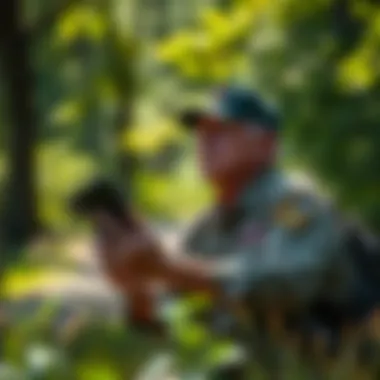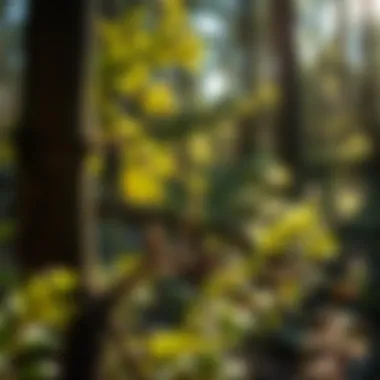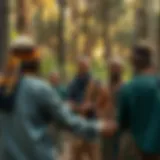Exploring the Veteran Parks Pass: Benefits and Impact


Intro
The dedication shown by veterans in serving their country is something that deserves immense recognition and respect. This commitment often extends to the protection of the lands they fought for, highlighting a crucial connection between veterans and the natural landscapes of the United States. The Veteran Parks Pass stands at the crossroads of these two realms, offering benefits that are not only practical for veterans but also significant for the conservation of woodland ecosystems.
Providing complimentary access to national parks and other recreational areas, this pass is more than just a piece of plastic. It embodies a pathway for veterans to reconnect with nature, fostering both physical and mental well-being. A walk in a serene forest or a peaceful moment by a tranquil lake can work wonders for the soul, especially for those who have faced the rigors of combat.
Key Topics to Explore
In this article, we will delve into various facets of the Veteran Parks Pass. We will discuss its benefits, outline eligibility requirements, and examine its influence on woodland conservation. Some focal points will include:
- Encouragement of outdoor engagement for veterans
- Impact on mental health and overall wellness
- The relationship between recreational access and ecological sustainability
- Inclusivity in conservation efforts for all service members
These discussions will set the stage for a deeper understanding of how the Veteran Parks Pass not only serves individual veterans but also contributes meaningfully to the health of our woodland ecosystems.
Understanding the Veteran Parks Pass
Understanding the Veteran Parks Pass is crucial for grasping how this initiative impacts not just veterans, but also broader conservation efforts. It serves as a bridge connecting individuals who have served in the military with the natural world—a connection that can be healing and invigorating. The parks pass is more than a mere ticket for entry; it symbolizes appreciation for service and provides numerous avenues for recreation and restoration. The program makes nature more accessible to those who have sacrificed their time and safety for the country, promoting both wellbeing and environmental stewardship.
Purpose and Overview
The Veteran Parks Pass enables eligible veterans to access national parks and other public lands without the usual fees that can deter many from visiting these natural spaces. The purpose of this program is not only to honor veterans but also to encourage them to engage with the outdoors. Spending time in nature can have numerous health benefits, offering a sense of peace that many find difficult to achieve in their day-to-day lives. Plus, the pass contributes to a more inclusive approach toward outdoor access, paving the way for those who served to become active participants in their surroundings.
The overview of the pass includes some key elements:
- Free access: Eligible veterans can visit national parks without worrying about entrance fees.
- Recreation: Encouragement of hiking, camping, and wildlife observation, which can lead to a healthier lifestyle.
- Awareness and engagement: Increases appreciation for the natural world, pushing veterans to explore and protect these treasured lands.
Historical Context
To fully appreciate the Veteran Parks Pass, it's important to explore its historical context. The relationship between military service and outdoor access has deep roots that date back to periods following major conflicts in the United States. After World War II, there was an emerging recognition of the physical and mental toll of service, prompting a societal push towards providing supportive resources for veterans.
In the latter part of the 20th century, various initiatives recognized the benefits of nature on mental health. As studies began to surface highlighting these advantages, legislation started to shift towards facilitating access for veterans. The development of the Veteran Parks Pass in recent years reflects a cumulative effort to address the needs of veterans while also emphasizing the importance of conservation. This initiative aligns with ongoing movements to promote public lands as spaces for healing, recreational opportunities, and ecological education.
The Veteran Parks Pass is now seen as a vital tool; it not only honors those who have served but also encourages them to become stewards of the very landscapes that provide solace and healing. It stands as a testament to a growing movement that connects service, mental wellbeing, and conservation.
Eligibility Criteria
In discussing the Veteran Parks Pass, understanding the eligibility criteria is crucial. It ensures that those who have served are recognized and supported in their quest to access nature's beauty. This section will clarify who qualifies for this pass and the steps needed to obtain it, shedding light on the overall inclusiveness of these programs for veterans.
Who Qualifies?
The qualifying criteria for the Veteran Parks Pass may seem straightforward on the surface but are broader than many realize. Primarily, any veteran with an honorable discharge is eligible. This inclusivity is vital, as it reinforces a sense of recognition and belonging among those who served in the military, irrespective of their specific role within the armed forces.
In addition to veterans, the families of service members can also benefit from the pass, making it a family-oriented initiative. It bridges gaps and creates opportunities for shared experiences in nature, which can be healing for those who have faced the challenges of military life.
Here are some specific points about who qualifies:
- Veterans with an honorable discharge
- Active-duty service members
- Members of the National Guard and Reserve
- Spouses and dependent children of these veterans
This relatively inclusive approach aims to honor diverse service backgrounds and contributions. By extending benefits to family members, it fosters a broader community connection and promotes mental well-being by encouraging outdoor activities together. The access not only serves those who have served but also strengthens the support networks around them.
Application Process
While eligibility is a major part of the conversation, the application process for the Veteran Parks Pass is just as essential. It’s designed to be user-friendly, facilitating smooth access to the great outdoors for eligible individuals.
To start, applicants typically need to provide some proof of service. This can include documentation such as a DD214 form, which serves as a record of military discharge. Here’s a simple outline of how the process generally unfolds:


- Gather necessary documents:
- Visit the designated application website or regional office:
- Fill out the application:
- Submit the application:
- Receive the Veteran Parks Pass:
- DD214 form or equivalent documentation
- Identification proving eligibility (e.g., a driver's license)
- Options may vary based on location, but many prefer applying online for convenience.
- This form requires personal details and proof of eligibility. It’s straightforward and typically doesn’t ask for complex information.
- After filling out, review for correctness and submit. You’ll receive confirmation, and processing usually takes only a few weeks.
- Once approved, the pass is sent by mail, granting access to national parks and other sites.
By making this process accessible, it ensures that veterans can swiftly step into the natural world, promoting engagement with outdoor activities that can enhance their well-being. The straightforwardness of the application, coupled with the thorough understanding of who qualifies, highlights the importance of these initiatives in honoring and empowering those who have served.
Benefits of the Veteran Parks Pass
The Veteran Parks Pass serves as a significant initiative aimed at enhancing the connection between America’s veterans and the natural landscapes that form the backbone of the country’s ecological health. The pass provides a unique opportunity for veterans to explore the breathtaking vistas of national parks without the financial burden that often comes with such excursions. It's not just a ticket to recreation; it embodies a pathway to revitalization—one that carries implications far beyond personal enjoyment.
Access to National Parks
One of the most immediate advantages of the Veteran Parks Pass is the easy access it grants to national parks across the United States. With an abundance of scenic beauty waiting to be discovered, veterans can experience environments that are wholly different from their daily routines or past military landscapes. The significance of visiting these natural wonders cannot be overstated.
Consider this, many veterans have expressed how nature acts as a healer, offering them tranquility and a respite from the challenges of returning to civilian life. Whether it’s traversing the rugged terrain of the Grand Canyon or enjoying the serene views at Yellowstone, these parks are sanctuaries from the everyday hustle. In turn, they foster a sense of belonging and connection to the land.
- Expansive Variety: There’s a park for every preference, whether one enjoys hiking, fishing, or simply savoring the beauty of a sunset over a lake.
- Year-Round Accessibility: Unlike many recreational areas that may close seasonally, national parks provide year-round access, allowing veterans to plan their visits at their convenience.
"Access to vast landscapes can break the monotony of life after service, offering healing and reconnection not only with nature but with oneself."
Financial Relief
Another key element of the Veteran Parks Pass is the substantial financial relief it can provide. Entering national parks often comes with entry fees that can add up, especially for families or groups visiting together. Many veterans may find their finances constrained due to various factors, including limited employment opportunities or health-related expenses. The pass alleviates this burden by allowing veterans and their immediate families to enjoy these spaces for free.
- Cost Savings: Such savings are particularly significant for families seeking outdoor activities as a low-cost recreational alternative.
- Travel Budgets: Veterans can redirect funds that would usually be spent on park fees towards travel, lodging, or activities that enhance their experience, reinforcing a greater sense of enjoyment.
Encouragement of Outdoor Activities
Encouraging veterans to engage in outdoor activities is perhaps one of the most vital benefits linked to the Parks Pass. The outdoors plays a crucial role in mental and physical well-being. Participation in activities like hiking, camping, or birdwatching is not only beneficial for fitness but also crucial for improving mental health.
When veterans explore nature, they often find themselves gaining more than just exercise:
- Increased Physical Activity: Getting active outdoors can combat issues like depression and anxiety that some veterans face post-service.
- Environmental Awareness: This pass fosters a sense of stewardship towards the environment. As veterans enjoy these spaces, they become more inclined to protect them and understand the importance of conservation.
In summary, the benefits of the Veteran Parks Pass extend well beyond initial access to parks. It nurtures community, promotes health, and fosters a stronger bond between veterans and nature. By lowering barriers and enhancing experiences, the pass paves the way for both individual enrichment and broader ecological awareness.
Mental and Physical Health Implications
The connection between nature and health is robust, often transcending conventional acknowledgement. As we delve into the mental and physical health implications of the Veteran Parks Pass, it’s crucial to underscore how these benefits extend not only to the veterans but also resonate within their communities. Engaging with natural environments contributes profoundly to overall well-being, promoting both psychological recovery and physical rejuvenation.
Therapeutic Benefits of Nature
Spending time outdoors, particularly in national parks and wooded areas, holds substantial therapeutic benefits. Nature acts as a restorative medium, reducing stress and anxiety while enhancing a sense of peace and tranquility. Veterans, having experienced the rigors of service, often find solace in these natural settings. The experience of witnessing vibrant landscapes, listening to rustling leaves, and inhaling crisp, fresh air can serve as a natural antidote to the emotional burdens many carry.
Research supports the notion that nature exposure can lower blood pressure, decrease cortisol levels, and improve mood. For veterans dealing with conditions like PTSD, these serene environments offer a welcome reprieve from overwhelming thoughts. The act of hiking or simply sitting by a serene lake can ground individuals, allowing them to reconnect with themselves, something that the fast-paced modern life often disrupts.
- Enhanced Mental Clarity: Studies indicate that engaging with nature can clear mental fog, enabling veterans to think more clearly.
- Emotional Regulation: Natural settings facilitate better emotional regulation, an essential skill for those who may experience spikes in anxiety or depression.
- Increased Physical Activity: Encouragement to engage in recreational activities not only promotes physical health but also bolsters mental well-being.


Moreover, programs aimed at integrating nature therapy into veteran support initiatives can provide structured avenues for these individuals to explore the outdoors safely, encouraging various outdoor activities. Whether it be through organized hikes or nature-based therapy sessions, veterans can cultivate meaningful experiences that contribute to healing.
Social Connectivity Among Veterans
Connecting with others who share similar experiences is invaluable. Veterans often find it challenging to relate their experiences to civilians. Engaging in outdoor activities presents opportunities for camaraderie that can bridge those gaps. National parks become a shared space where veterans can bond over their love for nature while also discussing their experiences and challenges in a supportive environment.
Participating in group activities fosters a sense of belonging, enabling veterans to forge friendships and support networks that may have dwindled since their service. This social aspect is critical, especially considering that loneliness can exacerbate mental health issues.
- Building Trust: Shared experiences in nature can help rebuild trust among veterans, allowing them to express their feelings in a judgment-free zone.
- Promoting Shared Goals: Working together on conservation efforts or participating in programs can create a sense of purpose.
- Creating Lasting Bonds: Positively interaction in nature can lay the foundation for lifelong friendships, providing social support.
Engaging in nature does not merely serve the individual; it creates a community of shared experiences and growth.
In essence, the implications of the Veteran Parks Pass extend far beyond mere access to parks. They catalyze engagement with the environment while simultaneously embracing the psychological and social needs unique to veterans. This dual impact ultimately nurtures both the individual and the collective, enhancing the health of people and the stewardship of our wooded landscapes.
Conservation and Stewardship
Conservation and stewardship play a pivotal role in ensuring the sustainability of our natural landscapes. The Veteran Parks Pass not only opens up opportunities for veterans to access nature but also positions them as integral guardians of these precious resources. By marrying recreation with conservation, we establish a vital connection that can transform both veterans' lives and the health of our woodlands.
Veterans as Stewards of the Land
Veterans have unique experiences and perspectives that equip them for stewardship roles in conservation efforts. Many veterans possess skills such as leadership, teamwork, and resilience, which can be effectively channeled into protecting and maintaining natural habitats. This ability to lead and inspire others becomes paramount, especially when rallying community support around conservation initiatives.
Moreover, when veterans are engaged with landscapes that they have defended, they often develop a sense of personal responsibility towards these environments. Their dedication is not just about participation; it’s about commitment to preserving nature for future generations. An engaging scenario might be when a local veteran organizes a cleanup event at a national park, leading fellow veterans and community members to remove litter and promote ecological awareness. Such actions symbolize their respect for the land and enhance their mental well-being through active involvement.
In integrating veterans into these stewardship roles, communities can benefit from their insights into discipline and strategy, thereby amplifying the effectiveness of conservation projects.
Engaging Veterans in Conservation Efforts
To improve engagement between veterans and conservation, specific programs can be launched, tailored to harness their skills and experiences. These initiatives might include:**
- Workshops on sustainable practices where veterans share knowledge and learn new conservation techniques.
- Volunteer Opportunities that allow veterans to take part in habitat restoration projects, which bridge the gap between personal interests and communal responsibilities.
- Outdoor Adventure Retreats focused on conservation education can also provide a platform for veterans to connect with nature and each other while learning about ecological stewardship.
“When veterans engage with nature, their understanding deepens, as does their connection to the community.”
As they plant trees or monitor wildlife, veterans can experience firsthand the impact of their efforts, which fosters a greater appreciation for ecosystem health.
In summary, the integration of veterans into conservation efforts not only serves to enhance ecosystem management but also empowers these individuals, granting them purpose and identity. By recognizing and leveraging the unique contributions that veterans can make to conservation, we can cultivate a resilient alliance between those who served and the land they cherish. This approach not only benefits the woodland ecosystems but also enriches the lives of the veterans themselves, highlighting the profound interconnection between human wellbeing and environmental health.
Challenges and Considerations
Understanding the challenges and considerations around the Veteran Parks Pass is essential in deciphering its true impact on veterans and the environment. While the pass itself offers numerous benefits, its potential is often hampered by various barriers. Identifying these obstacles allows for a better approach to enhancing accessibility and promoting knowledge around its use and purpose.
Barriers to Access
Barriers to access refer to the multitude of factors that can prevent veterans from fully utilizing the Veteran Parks Pass. One major hindrance is geographical. Many veterans may reside far from national parks, making it difficult for them to take advantage of their pass. For example, a veteran living in a city with limited transportation options might find it challenging to reach a park located several hours away.
Other barriers include physical limitations. Some veterans may be dealing with disabilities that make hiking or trekking tough. The design and development of parks primarily cater to those without mobility issues, sometimes leading to pathways and facilities that are not accessible.
Furthermore, there is the financial aspect. While the pass offers free entry to numerous parks, other expenses—like travel costs or lodging—can pile up quickly. This can weigh heavily on veterans who might already be facing financial difficulties.
Awareness and Information Gaps
Awareness plays a pivotal role in the effective use of the Veteran Parks Pass. Quite a few veterans remain oblivious to the existence of the pass or its benefits. Research shows that information gaps exist not only within veteran communities but also among support organizations. This disconnect can hinder many veterans from even applying for the pass or utilizing it effectively.
"The disconnect in information can create a ripple effect, preventing veterans from connecting with nature, which is both a right and a remedy."


Communication strategies need to improve. For instance, if information about the pass gets shared primarily through social media or flyers at events, it may not reach all veterans. Traditional forms of communication or direct outreach could bridge this gap.
Moreover, many veterans may not know about the specific parks where they can use their pass. Establishing a central hub online detailing these locations can also keep veterans informed, thus encouraging them to explore and engage with decentralized woodland ecosystems. This could also serve as a launchpad for community initiatives and partnerships aimed at enhancing accessibility.
Future Implications
The implications surrounding the Veteran Parks Pass stretch beyond mere access to parks; they are intertwined with the fabric of policy reforms and wildlife conservation efforts. By closely examining the potential future impact of this program, we can unravel forthcoming opportunities and challenges that need addressing. The connection between granting veterans access to natural resources and the growth of conservation initiatives has proven quite significant, thereby showcasing the broader benefits of such programs.
Policy Developments
As the Veteran Parks Pass continues to thrive, one can't help but notice the implications for future policy developments. The relationship between veteran access and public lands is ripe for reevaluation. Policymakers must ponder how to effectively integrate this pass into broader strategies aimed at land-use policy. This might involve collaborating with veterans' groups to assess the effectiveness of the program and identify any necessary adjustments. It is imperative that policies evolve as new data emerges, ensuring that they remain relevant to the needs of veterans and conservation efforts alike.
Moreover, linking the pass to legislative initiatives may inspire more funding directed towards park maintenance and conservation practices. This funding could also finance programs aimed at educating veterans and the public about the importance of these natural resources—a vital step in fostering a culture of stewardship.
Expanding Access to Other Natural Resources
While the Veteran Parks Pass primarily opens doors to national parks, its future could herald broader access to natural resources. Many veterans express a desire to not just walk among towering trees, but to engage with varied landscapes, from wetlands to maritime parks. This expansion would not only be beneficial economically by reinforcing local communities reliant on recreational tourism, but it would also provide veterans opportunities to explore diverse ecosystems and enhance their connection to nature.
Providing access to a range of natural resources cultivates an appreciation for the intricate networks within our ecosystem. Diversifying access could galvanize responsible outdoor recreational activities.
Community Engagement and Educational Initiatives
Community engagement plays a pivotal role in the effective implementation and success of the Veteran Parks Pass. This program is not merely a tool for access; it’s a bridge connecting veterans, their families, and local ecosystems. By fostering participation and education, it cultivates a deeper understanding of the importance of nature in enhancing well-being and environmental stewardship among veteran communities.
Among the specific elements that underscore the significance of community engagement are programs designed with veterans and their families in mind, which allow these groups to interact with nature in meaningful ways. Initiatives that cater to different interests and needs ensure inclusivity, promoting participation from a broader demographic. This engagement can encompass a variety of activities, from guided park tours to hands-on conservation projects, creating opportunities to learn about ecological practices while sharing experiences with peers.
Programs for Veterans and Families
Programs tailored for veterans and their families are instrumental in enhancing access to national parks while enriching their understanding of environmental conservation. These initiatives often incorporate family-friendly activities, encouraging group involvement and bonding in a setting that promotes relaxation and reconnection with nature.
- Outdoor Adventure Programs: Many organizations offer guided hikes or wildlife watching events, specifically designed for veterans and their families. These activities help deepen appreciation for the natural world, encouraging curiosity and environmental literacy.
- Mentorship and Buddy Programs: Pairing veterans with park rangers or conservationists can help create informal educational experiences. Not only do veterans receive personalized guidance, but the mentors benefit as well through insights gained from shared experiences.
- Community Service Projects: Participating in environmental cleanup and restoration projects fosters teamwork among veterans. These initiatives harness their skills acquired during service and provide tangible contributions to nature.
Workshops on Conservation Practices
Workshops focusing on conservation practices provide veterans with practical skills and knowledge to engage in effective environmental stewardship. These sessions are often led by seasoned conservationists and educators who convey the urgency of protecting woodland ecosystems and biodiversity.
- Hands-On Learning: Workshops that incorporate hands-on activities, such as tree planting or invasive species removal, engage participants in learning that resonates beyond theoretical discussions. Participants not only gain skills but feel a sense of accomplishment through tangible contributions.
- Educating on Sustainable Practices: Offering workshops that cover sustainable practices also aids in empowering veterans. Learning about composting, sustainable landscaping, and wildlife habitats allows veterans to make eco-friendly decisions in their daily lives.
- Community Networks: Workshops can build local networks among veterans passionate about conservation. These connections foster a sense of belonging and community support, further encouraging ongoing engagement with nature and conservation efforts.
"Fostering an environment where veterans can learn, connect, and contribute leads to a more inclusive and sustainable approach to conservation."
In summary, community engagement and educational initiatives tailored for veterans and their families not only promote recollection and relaxation within the natural environment but also enhance the collective effort toward woodland conservation. These efforts manifest as a powerful testament to the potential of the Veteran Parks Pass to serve as more than just a means to access parks; it can become a catalyst for community growth and ecological awareness.
The End
In contemplating the Veteran Parks Pass, one might recognize it’s not merely about offering admissions to parks; rather, it establishes an intricate relationship between veterans and the environment. This connection encourages both personal well-being and a sense of responsibility towards our natural resources. With the unique challenges faced by veterans, the pass serves as a vital tool for reconnecting them with the healing powers of nature.
Summation of Key Insights
Looking back across the various aspects covered in this article, it’s clear that the Veteran Parks Pass manifests multiple benefits:
- Access to Nature: It provides veterans with the chance to explore national parks and other natural spaces, enhancing their mental and physical health.
- Financial Aid: By reducing the cost of entry to parks, it alleviates some financial burdens many veterans face.
- Community and Conservation: Engaging veterans in conservation efforts not only helps in preserving woodland ecosystems but also fosters a sense of community among those who have served.
Furthermore, the insights gained emphasize the importance of inclusivity in nature-based programs. By ensuring that veterans have the means and encouragement to access these resources, we promote broader societal awareness of the critical role that nature plays in mental health and community development.
Call to Action for Continuous Improvement
The trajectory of the Veteran Parks Pass is one that requires ongoing evaluation and refinement. Advocates and policy-makers should continue to scrutinize any barriers that might restrict veterans’ access to these facilities. Here are some steps that could be undertaken:
- Enhancing Outreach Efforts: Raising awareness about the pass and its benefits through targeted campaigns can clear up misunderstandings and promote inclusivity.
- Expanding Partnerships: Building collaborations between veteran organizations and conservation groups will deepen community ties and broaden the conservation dialogue.
- Feedback Mechanisms: Establishing platforms for veterans to share their experiences with the pass will help stakeholders understand its impact and identify areas for growth.
"Nature is not a place to visit. It is home." This quote underscores the fundamental goal of initiatives like the Veteran Parks Pass: to reclaim nature as a refuge and a source of strength for those who have given much for their country.







